Related Research Articles
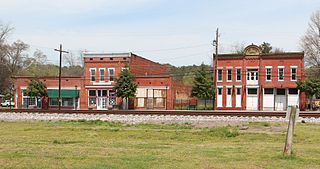
Kingston is a village in Bartow County, Georgia, United States. The population was 722 at the 2020 census.
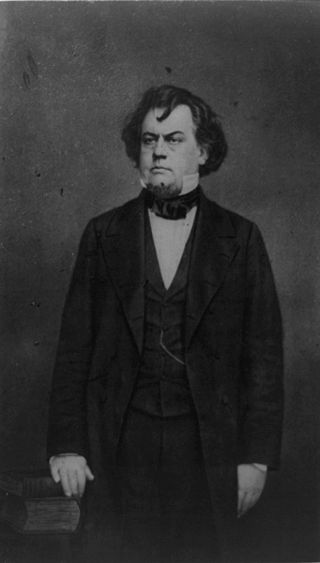
Robert Augustus Toombs was an American politician from Georgia, who was an important figure in the formation of the Confederacy. From a privileged background as a wealthy planter and slaveholder, Toombs embarked on a political career marked by effective oratory, although he also acquired a reputation for hard living, disheveled appearance, and irascibility. He was identified with Alexander H. Stephens's libertarian wing of secessionist opinion, and in contradiction to the nationalist Jefferson Davis, Toombs believed a civil war to be neither inevitable nor winnable by the South.

The flags of the Confederate States of America have a history of three successive designs during the American Civil War. The flags were known as the "Stars and Bars", used from 1861 to 1863; the "Stainless Banner", used from 1863 to 1865; and the "Blood-Stained Banner", used in 1865 shortly before the Confederacy's dissolution. A rejected national flag design was also used as a battle flag by the Confederate Army and featured in the "Stainless Banner" and "Blood-Stained Banner" designs. Although this design was never a national flag, it is the most commonly recognized symbol of the Confederacy.
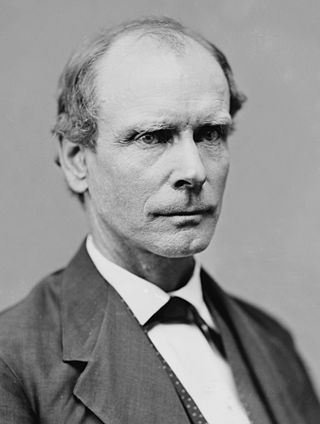
Amos Tappan Akerman was an American politician who served as United States Attorney General under President Ulysses S. Grant from 1870 to 1871. A native of New Hampshire, Akerman graduated from Dartmouth College in 1842 and moved South, where he spent most of his career. He first worked as headmaster of a school in North Carolina and as a tutor in Georgia. Having become interested in law, Akerman studied and passed the bar in Georgia in 1850; where he and an associate set up a law practice. He also owned a farm and enslaved eleven people. When the American Civil War broke out in 1861, Akerman joined the Confederate Army, where he achieved the rank of colonel.

The Confederate States Army, also called the Confederate Army or the Southern Army, was the military land force of the Confederate States of America during the American Civil War (1861–1865), fighting against the United States forces to win the independence of the Southern states and uphold and expand the institution of slavery. On February 28, 1861, the Provisional Confederate Congress established a provisional volunteer army and gave control over military operations and authority for mustering state forces and volunteers to the newly chosen Confederate States president, Jefferson Davis (1808-1889),. Davis was a graduate of the United States Military Academy, on the Hudson River at West Point, New York, colonel of a volunteer regiment during the Mexican–American War (1846-1848). He had also been a United States senator from Mississippi and served as U.S. Secretary of War under 14th President Franklin Pierce. On March 1, 1861, on behalf of the new Confederate States government, Davis assumed control of the military situation at Charleston Harbor in Charleston, South Carolina, where South Carolina state militia had besieged the longtime Federal Fort Sumter in Charleston harbor, held by a small U.S. Army garrison under the command of Major Robert Anderson. (1805-1871). By March 1861, the Provisional Congress of the Confederate States meeting in the temporary capital of Montgomery, Alabama, expanded the provisional military forces and established a more permanent regular Confederate States Army.

Alexander Hamilton Stephens was an American politician who served as the first and only vice president of the Confederate States from 1861 to 1865, and later as the 50th governor of Georgia from 1882 until his death in 1883. A member of the Democratic Party, he represented the state of Georgia in the United States House of Representatives before and after the Civil War.

Howell Cobb was an American and later Confederate political figure. A southern Democrat, Cobb was a five-term member of the United States House of Representatives and the speaker of the House from 1849 to 1851. He also served as the 40th governor of Georgia (1851–1853) and as a secretary of the treasury under President James Buchanan (1857–1860).
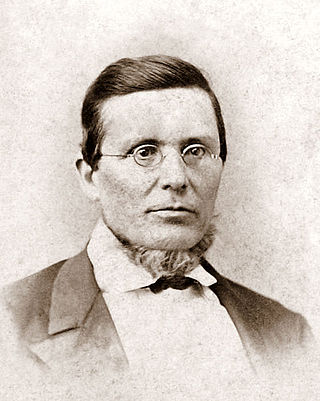
Thomas Hill Watts Sr. was the 18th Governor of the U.S. state of Alabama from 1863 to 1865, during the Civil War.
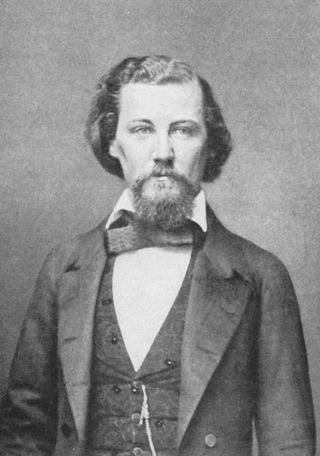
Clement Claiborne Clay, also known as C. C. Clay Jr., was a United States Senator (Democrat) from the state of Alabama from 1853 to 1861, and a Confederate States senator from Alabama from 1862 to 1864. His portrait appeared on the Confederate one-dollar note.

The Confederate States Congress was both the provisional and permanent legislative assembly / legislature of the Confederate States of America that existed from February 1861 to April / June 1865, during the American Civil War. Its actions were, for the most part, concerned with measures to establish a new national government for the Southern proto-state in the current Southern United States region, and to prosecute a war that had to be sustained throughout the existence of the Confederacy. At first, it met as a provisional congress both in the first capital city of Montgomery, Alabama, and the second in Richmond, Virginia. As was the case for the provisional Congress after it moved northeast to Richmond, the permanent Congress met in the existing Virginia State Capitol, a building which it also shared with the secessionist Virginia General Assembly.

Cassville is an unincorporated community in Bartow County in the U.S. state of Georgia. It was originally the county seat before the name was changed from Cass County. The seat was moved to Cartersville after General Sherman destroyed Cassville in his Atlanta Campaign of 1864.

Ambrose Ransom "Rans" Wright was an American lawyer, politician, and Confederate general in the American Civil War.
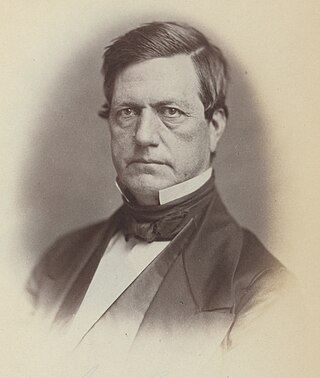
John Bullock Clark Sr. was a militia officer and politician who served as a member of the United States Congress and Confederate Congress. Born in Kentucky, Clark moved with his family to Missouri in 1818 and studied law. He opened a legal practice in Fayette, Missouri, in 1824. He held several positions in the local government in the 1820s and 1830s. Clark was also involved in the state militia, serving as a colonel in the Black Hawk War in 1832 and eventually rising to the rank of major general. In 1838, during the Missouri Mormon War, Clark was the recipient of Governor Lilburn Boggs's infamous Mormon Extermination Order, and was involved in the ending stages of the conflict. He was the Whig candidate in the 1840 Missouri gubernatorial election. Clark was accused of conspiring to commit electoral fraud in the election and as a result almost fought a duel with Claiborne Fox Jackson, later a Governor of Missouri.

Alabama was central to the Civil War, with the secession convention at Montgomery, the birthplace of the Confederacy, inviting other slaveholding states to form a southern republic, during January–March 1861, and to develop new state constitutions. The 1861 Alabaman constitution granted citizenship to current U.S. residents, but prohibited import duties (tariffs) on foreign goods, limited a standing military, and as a final issue, opposed emancipation by any nation, but urged protection of African-American slaves with trials by jury, and reserved the power to regulate or prohibit the African slave trade. The secession convention invited all slaveholding states to secede, but only 7 Cotton States of the Lower South formed the Confederacy with Alabama, while the majority of slave states were in the Union at the time of the founding of the Confederacy. Congress had voted to protect the institution of slavery by passing the Corwin Amendment on March 4, 1861, but it was never ratified.
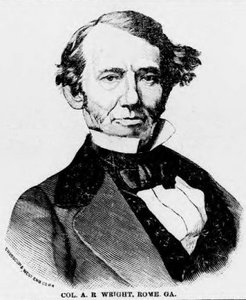
Augustus Romaldus Wright was an American politician and lawyer, who briefly served against the United States as a colonel in the Confederate States Army during the American Civil War. He resigned his commission to serve in the Confederate Congress.
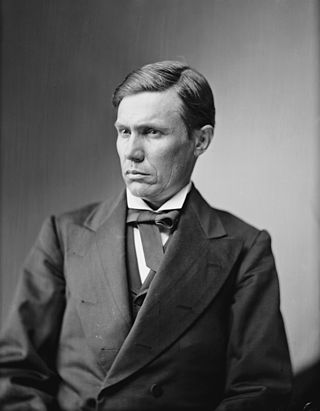
Milton Anthony Candler was an American lawyer, Confederate officer and politician from an influential Georgia family of businessmen and politicians. He served two terms in the U.S. House of Representatives.

Thomas Hardeman Jr. was an American politician, lawyer and soldier.

Alfred Burton Greenwood was an American attorney, judge, and a politician who served three terms in the U.S. House of Representatives from 1853 to 1859. When Arkansas seceded from the Union in the Civil War, he was elected to the Confederate Congress as a Democrat. In between, he served under President James Buchanan as Commissioner of Indian Affairs.

The Confederate government of Kentucky was a shadow government established for the Commonwealth of Kentucky by a self-constituted group of Confederate sympathizers and delegates sent by Kentucky counties, during the American Civil War. The shadow government never replaced the elected government in Frankfort, in which the state legislature had strong Union sympathies while the governor was pro-Confederate. Neither was it able to gain the whole support of Kentucky's citizens; its jurisdiction extended only as far as Confederate battle lines in the Commonwealth, which at its greatest extent in 1861 and early 1862 encompassed over half the state. Nevertheless, the provisional government was recognized by the Confederate States of America, and Kentucky was admitted to the Confederacy on December 10, 1861. Kentucky, the final state admitted to the Confederacy, was represented by the 13th (central) star on the Confederate battle flag.

The Cherokee in the American Civil War were active in the Trans-Mississippi and Western Theaters. In the east, Confederate Cherokees led by William Holland Thomas hindered Union forces trying to use the Appalachian mountain passes of western North Carolina and eastern Tennessee. Out west, Confederate Cherokee Stand Watie led primarily Native Confederate forces in the Indian Territory, in what is now the state of Oklahoma. The Cherokee partnered with the Confederacy in order to get funds, as well as ultimately full recognition as a sovereign, independent state.
References
- 1 2 3 4 "Warren Akin, Sr. – Confederate Congressman". Etowah Valley Historical Society. 2018. Retrieved November 23, 2018.
- ↑ "Akin, Warren". OurCampaigns.com. Retrieved November 24, 2018.
- ↑ Isaac Wheeler Avery (1881). The History of the State of Georgia from 1850 to 1881: Embracing the Three Important Epochs: the Decade Before the War of 1861-5; the War; the Period of Reconstruction. Brown & Derby. p. 212.
- ↑ Georgia. General Assembly. House of Representatives (1862). Journal ... p. 1.
- ↑ South Carolina. General Assembly. House of Representatives (1861). Journal of the House of Representatives of the State of South-Carolina. State Printers. pp. 1–.
- ↑ Georgia's Public Men 1902-1904. Byrd Printing Company. 1902. p. 103.
- 1 2 3 4 5 Warren Akin (1 June 2010). Letters of Warren Akin: Confederate Congressman. University of Georgia Press. pp. 7–. ISBN 978-0-8203-3555-1.
- ↑ Perman, Michael. Major Problems in the Civil War and Reconstruction. 2nd ed. Houghton Mifflin. 1998, 223
- ↑ Michael Stillman. "Rare Americana from David Lesser Antiquarian Books - Advertisement of rare Americana" . Retrieved November 24, 2018.
- ↑ S. Lester Tate, III (2002). "Calendar Call" (PDF). The General Practice & Trial Section Of The State Bar Of Georgia. p. 3. Retrieved November 24, 2018.
